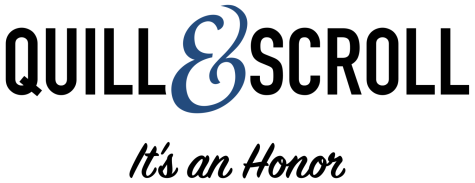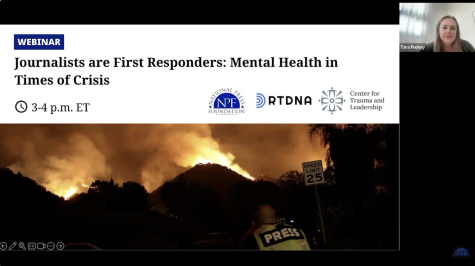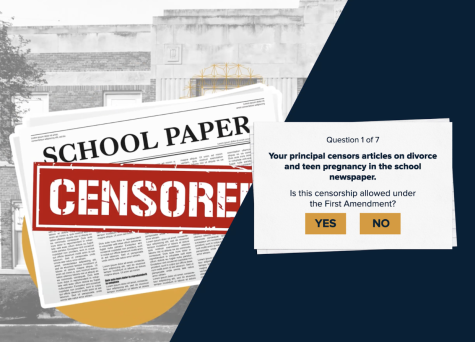Sept. 15, 2025
Our past three editions
Sept. 8, 2025 Cell phones in school • AI • “The Summer I Turned Pretty”
May 5, 2025 Hazing • Federal funding • Conspiracy theories
April 21, 2025 National Parks • Roblox kidnapping • Blue Origin flight
THE LEAD
Start of school year brings traumatic news cycle
Share resources for coping while covering, reading news
The first few weeks of school have brought with them no shortage of intense news events, including the shooting at Annunciation Catholic School in Minnesota, the shooting at Evergreen High School in Colorado and the shooting of conservative political activist Charlie Kirk at Utah Valley University.
The shooting at Utah Valley University has brought up a conversation about balancing free speech and security at controversial campus events. In a segment on NPR’s All Things Considered, Robert Shibley, special counsel for campus advocacy at the Foundation for Individual Rights and Expression, pointed out that as more people see violence as acceptable, the more people will resort to violence.
Every year, the Foundation for Individual Rights and Expression, or FIRE, does a survey of college students about free speech on campus. The 2026 survey, published Sept. 9, said 34% of students think it is acceptable in some cases to use violence to stop a speaker. That marks an increase from 2025.
What you can do—
Regardless of how your community was or wasn’t touched by recent events, students and staff are undoubtedly consuming content online about them. As student journalists, it is important to learn how to cope with reporting on and reading coverage of traumatic events.
A number of journalism organizations have resources built to help with this sort of thing. Trauma Aware Journalism has sets of resources about things like handling traumatic imagery and taking care of yourself during and after coverage. Trust for Trauma Journalism also has informational videos that could be the basis of a class conversation. Journalists all over the world have written articles and columns about this challenge as well.
Consider bringing in an expert who studies this or a professional journalist who is willing to share their experiences and tips. Starting a discussion of coping mechanisms and managing mental health in the newsroom before it is direly needed will help train strong, responsible reporters.
Noteworthy
Major heat waves linked to fossil fuel production in new study
Cover the effects of heat waves in your area, dive into the science
Though fall temperatures have started to arrive in some parts of the country, the heatwaves of summer aren’t yet over — and there is new research about high temperatures. A new study out in the journal Nature links more than 200 heatwaves over the past few decades to major fossil fuel producers.
About a quarter of the heat waves the study looks at were deemed “virtually impossible” without pollution from major fuel producers like ExxonMobil, Chevron and BP, NPR reported.
What you can do—
This study is not the first to link heat waves to fossil fuel producers, and it likely won’t be the last, but it provides a timely news peg for a story about heatwaves in your area. If your area experienced unusual heat this summer, talk to people about how it affected them? Touch base with researchers who study the effects of heat in your area.
High heat touches virtually every part of life, including human health. One direction this story could take is looking at school preparedness for heatwaves? (Though that story might make more sense for the end of the school year, depending where you live). Does your school switch its temperature control to boilers in the fall? How does that affect how the building feels? It would also be interesting to look at historical data for your area — how have patterns changed?
What’s viral
Emmys awarded Sept. 14 to top TV shows
Gather student reactions, opinions
Sunday marks the 77th Emmy Awards. The ceremony took place in the Peacock Theater in downtown Los Angeles. This year’s nominees brought with them some interesting storylines, CNN reported. In the supporting actor and actress in drama categories, “Severence” and “Lotus” have three and four nominees respectively, making for some costar competition.
The show’s host, comedian Nate Bargatze, told CNN he has an interesting plan to keep acceptance speeches short. He will donate $100,000 to the Boys and Girls Club of America, and for every second an acceptance speech goes over, the donation will be reduced by $1,000. (If the speeches are shorter than the allotted 45 seconds, $1,000 will be added back to the total.)
What you can do—
After the awards show, check in with students and staff in your community to see what they think. What actors or shows were snubbed? Did any shows win big that they think didn’t deserve too?
As with any awards show, the Emmys are a retrospective look at the last year in television. You could also take this opportunity to look forward at TV shows that are highly anticipated for this upcoming year. There are also new shows out this fall to review and gather opinions on.
Seeing as Bargatze’s donation amount depends on the rule following of Hollywood stars, there might be an interesting opinion article about the merits of tying a charitable donation to an awards show in this way.
IT’S AN HONOR
Student Advisory Board applications due Sept. 19
Do you want to serve your fellow student journalists and Quill and Scroll members? Join the Student Advisory Board for 2025-26. Applications close Sept. 19.
SAB members will work on projects including establishing a regular communications channel for editors and other student journalists to discuss problems, successes, and coverage; and working on projects and activities that can aid Quill and Scroll chapters.
It’s always membership season
Don’t forget you can nominate members year round
Do you have a senior who just met the GPA requirement or a student who now wants to join Quill and Scroll? Want to avoid the spring rush? Nominate students for membership, order pins, cords and other Quill and Scroll materials and memorabilia now.
We haven’t changed the ordering process from last year. For those wanting to ditch the paper version, you just need to select the form based on how you would like to pay. We have one version for credit card and another version for check or purchase order. As usual, credit card payments are charged $4.49 per order for processing.
Submit your YEC entries today
Only two weeks until contest closes, submit today
The 2025 Yearbook Excellence Contest is open for entries. The cost for each entry in all 39 categories is $8, and schools will be divided by size — Class A for 1,000 or more students, and Class B for 999 or fewer students.
The entry deadline is Oct. 1, and here is a link to complete descriptions of those 39 categories and how to pay for the entries. Please note, we’ve added six new categories in recent years — including three for beginning students and three for middle schoolers.
Judges will award first, second and third places in each category for each class, and they’ll award honorable mentions so that between 10 and 15 % of all entries are recognized in every category. All students named as award recipients will be eligible to apply for Quill and Scroll student scholarships in May of their senior year.
Quill and Scroll administrators will then tally points (5 for first place, 4 for second, 3 for third and 1 for Honorable Mention) to determine a Blue and Gold Sweepstakes Award winner for each class. Last year’s overall winners were Wando High School of Mount Pleasant, South Carolina and Shawnee Mission South High School of Overland Park, Kansas (Class A) and Christ Presbyterian Academy of Nashville, Tennessee (Class B).
Here’s a complete list of last year’s winners.
Take advantage of our advisers-only resource area
Quill and Scroll has expanded its advisers-only area, which includes bellringers and lesson plans for advisers who have initiated members within the past school year. We will be highlighting a helpful resource in each Weekly and Month Scroll.
Advisers, if you inducted members in the 2024-25 or the 2025-26 school year, check your email (and your spam!) for a message from [email protected]. That email should contain your login information. Please be sure to accept cookies when you log in! If you have trouble, you can contact us at [email protected]. If you have inducted members this school year, we update access every few weeks, so keep an eye on your email.
We will be highlighting specific content from the advisers-only area in each Monthly Scroll, so keep reading for some ideas.
National High School Journalism Convention travels to Nashville
This fall the nation’s largest gathering of high school journalists, advisers and journalism teachers will be Nov. 13-16 at the Gaylord Opryland Resort & Convention Center.
The JEA/NSPA National High School Journalism Convention offers hundreds of instructional sessions, keynote speakers from national newsmakers, dozens of media critiques, JEA’s popular on-site media contests and the announcement of the NSPA Broadcast and Newspaper/Newsmagazine and Specialty Magazine Pacemakers. The winners in the NSPA Individual Awards will also be announced.
NSPA also offers a convention Best of Show competition that celebrates current student media from the current school year. The deadline for submitting Individual Achievement entries is Oct. 29. Staff Achievement entries are due at the convention on Nov. 14.
Registration is open now. The early bird discount ends Oct. 3 and online registration will close Oct. 24.
School of the New York Times Summer Academy opportunity
We know it’s early, but for those looking for a 2026 journalism learning opportunity, it’s not too early to begin planning. The School of the New York Times Summer Academy is one of the nation’s most competitive journalism programs — and Quill and Scroll members get exclusive early access.
Summer Academy is open to high school students (grades 10-12 and Graduating Seniors based on the grade the student is entering in the Fall 2026 school year). Students must be 15-years old by the first day of their session. Program graduates have been recruited from some of the top journalism schools in the nation.
All students applying to Summer Academy for the first time are required to complete an online application. Returning students do not need to reapply. As a member school, Quill and Scroll chapter members will have access to pre-registration, which is now open. Last year this program received more than 14,000 applications for 1,700 seats. By going through pre-registration, your chance of being an attendee increases.
Also, don’t forget that students from schools with a Quill and Scroll Charter can receive $500 off enrollment in the Summer Academy in addition to early enrollment incentives.
Additionally, the winning entries from our News Writer of the Year (Category 16 in Quill and Scroll’s Writing, Visual, Multimedia Contest) are eligible to compete for a School of the New York Times scholarship to its Summer Academy. This scholarship (valued at $7,500) includes room and board but not transportation to New York City. Student entries will be evaluated by faculty from the New York Times.
The School of the New York Times will host a Virtual Admissions Information Session later this fall.
The round 1 deadline will be in mid December. The application in mid-September.
Plan ahead
We will be out of the office during the weeks of Oct. 13-17 and Nov. 10-14. We will not be able to send or process orders during this time — including overnight orders. Please remember we need at least three weeks from the time we receive your purchase order or payment to the time you need the materials. We will process all orders as they are received.
Just a thought
I love a good quiz. I’ll take almost any.
As my coworkers will tell you, I also love Constitution Day, which is Sept. 17.
The Constitution Center has released a quiz to test First Amendment knowledge.
In the four or five times I’ve taken it prior to writing this, each iteration had a few new questions. I might have been five minutes late to a meeting because I kept taking the seven-question quiz.
As soon as the meeting ended, I went back and took the quiz again, but with a different purpose. Teachers could use this quiz in their classes. I took it this time looking for ways teachers could use in their classes.
And then I hit the Hazelwood v Kuhlmeier question. Which reads, “Your principal censors articles on divorce and teen pregnancy in the school newspaper. Is this censorship allowed under the First Amendment? Yes or No.”
I answered, of course, “no.” Easy.
It said I was wrong.
The explanatory blurb said “In Hazelwood v. Kuhlmeier (1988), the Supreme Court ruled in a 5-3 decision that a school official can block the publication of a student newspaper, as long as the decision is ‘reasonably related to legitimate [educational] concerns.’”
I spent about two hours calming down and then sending a note to the Constitution Center to notify them of this oversimplification and misapplication.
To me, this is a great reminder that while quizzes are great, it’s important to use them as a building block. I still think the quiz can be used in a classroom, however, I will stick to my original lesson plan I was working on before the question arose.
When students take the quiz, they could look out for a case they don’t already know. (Yes, Tinker and Bethel are both there, but several others I didn’t know about were there too.) They could research the case and provide an overview of what happened and the resulting decision. (This could be done in a slide format that then is shared with the class. Examine if any additional rulings were made and any other useful information that can be found about the case. (And yes, SPLC is a great resource for many of these cases.)
Sometimes a quiz is just a starting point and the answer may not be as informative as we think it should be. This situation has been a great reminder of that.
I’m fortunate to also be in a country in which I can contact the organization who wrote the quiz and share my concern.
And yes, if you need something else for Constitution Day please know many activities and items are out there. Quill and Scroll has a school-wide activity and the Scholastic Press Rights Committee has several activities and lesson plans as well.)
— Lori Keekley






